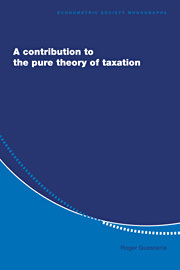Contribution to the pure theory of taxation, (econometric society monographs) paper Econometric Society Monographs Series, Vol. 25
Langue : Anglais

Now available in paperback this book investigates the way in which tax systems affect economic efficiency and the distribution of welfare. It examines within a unified framework questions that are usually treated in different areas of the literature: institutional economics, positive economics, normative economics, and political economics. It adheres to the rigorous standards of pure theory while paying careful attention to the policy relevance of the arguments. Tax systems are viewed as information extracting devices that generate sets of equilibria of complex geometry. A tax reform methodology is proposed that sheds light on optimal taxes. Social conflicts in the determination of taxes are shown to have effects on social cohesion.
Introduction: 1. An overview of chapter 1: the institutional economics of taxation, 2. A presentation of the model, 3. An overview of chapter 2: positive economics, 4. An overview of chapter 3: normative economics of taxation, 5. An overview of chapter 4: normative economics of taxation: further issues, 6. An overview of Chapter 5: the political economics of taxation, 1. Institutional economics of taxation: 1.1. Introduction, 1.2. The model, 1.3. Allocation via game forms, 1.4. Tax systems versus game forms, 1.5. More on game forms versus tax systems, 1.6. Coming back on the anonymity assumption, 1.7. Conclusion, 1.8. Bibliographical note, 2. Positive economics: the structure of tax equilibria, 2.1. The basic model, 2.2. The local structure of the set of tax equilibria, 2.3. The global structure of the set of tax equilibria, 2.4. Positive economics: tax equilibrium and tax incidence, 2.5. Bibliographical note, 3. Normative economics of taxation: reform and optimization, 3.1. Tax reform, the canonical argument, 3.2. Tax reform: a closer examination of specific situations, 3.3. Tax reform: from infinitesimal to finite changes-algorithms of tax reform, 3.4. Tax reform - further discussions, 3.5. Second-best Pareto optima, 3.6. Bibliographical note, 4. Normative economics of taxation: further essays on optimization and reform, 4.1. The social values of commodities, 4.2. Non-linearities and quotas policies, 4.3. Optimal taxes and tax reform in a one-consumer economy, 4.4. Mixing linear and non-linear taxation, a bird's eye view, 4.5. Bibliographical note, 5. Political economics of taxation, 5.1. Introduction, 5.2. The structure of the set of Pareto optimal tax equilibria, 5.3. Taxation as a social choice or a game theoretical problem, 5.4. A one-dimensional version of the taxation game, 5.5. Further remarks on the one-dimensional taxation game, 5.6. Bibliographical note, Conclusion, Mathematical appendix, Bibliography, Index.
Date de parution : 09-1995
15.9x23.5 cm
Épuisé
© 2024 LAVOISIER S.A.S.



